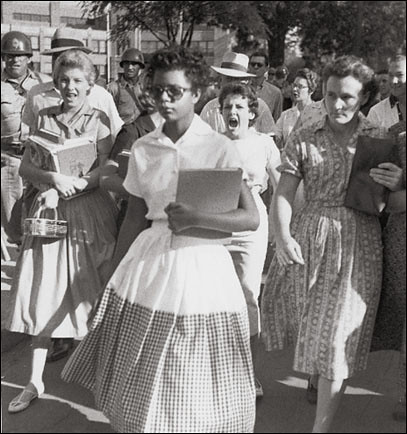If you enjoy what you find here, be sure to subscribe or become a follower, so you can keep up with all my bloggy goodness.
Guess what? I'm a guest blogger today, over at Big Mama's The Bristol Project. Go check out my post and her super blog!
Guess what? I'm a guest blogger today, over at Big Mama's The Bristol Project. Go check out my post and her super blog!
Have you ever been caught off guard by something, and then felt surprised that you were caught off guard in the first place?
 |
| source |
On my way home yesterday afternoon, I saw a little black boy riding his bike down the street. To be honest, it struck me as odd because I was in a traditionally white neighborhood. Not a rich neighborhood, mind you, just traditionally white. In fact, it really is a working class and poverty-stricken neighborhood more than anything, but that is a story for another time.
You may have noticed that I called the boy "black," rather than African-American. You see, that's what we really say here in VA, at least in my corner of it. Now, we aren't trying to be ugly or anything. They call me "white" and I'm fine with that. This boy, had he himself been from Africa, as some of our local refugees are, would likely be called a refugee, or black, rather than an African-American, even. But, this is a rant for another day.
So, to get back to my story... there's a little black boy riding his bike on the sidewalk next to the road and I feel taken aback. Why, you wonder? Well, Roanoke, VA has a deep, dark secret. Back in the 2000 Census, it was considered to be the most segregated city in Virginia. Also, my hometown ranked 66th in segregation amongst 300 and some metropolitan areas nationwide. So, we still aren't quite used to seeing integration creep into our neighborhoods.
 |
| source |
Up until a few years ago, children were still bussed into other neighborhoods in order to integrate the schools, under a city-wide Magnet program. Schools in less desirable, crime-ridden areas, would begin offering special application- only programs in dance or theater, math or science. Parents would apply to these schools, and suddenly there was an influx of white children into the black schools. Of course, it went the other way around, too, but not nearly as often. This program was discontinued due to funding a few years ago. Then, about two years ago, the city decided to cut costs by eliminating the need for bussing and redrew the lines so that most children now attend their neighborhood schools. Like it or not, segregation has somewhat returned.
 |
| source |
So, in a city so full of difficult race-relations, one could only wonder why I felt surprised at encountering a black child in a white neighborhood. Well, quite honestly, I thought I had somehow managed to grow up unfazed by the color of one's skin. I try not to be racist, really I do. I have claimed to enjoy getting to know people for who they are, rather than their race. But, try as I might, I didn't ignore the color of this child's skin as he rode down the road. In some instances, I guess the culture in which we are raised really defines us. I'm going to try harder to teach my children to love people for who they are, rather than what they look like, how they speak, or the culture from which they come. There's still a lot of work to do. Let's get going.
 |
| source |

"I'm going to try harder to teach my children to love people for who they are, rather than what they look like, how they speak, or the culture from which they come."
ReplyDeleteI think that is a courageous thing to do, and I'm with you 100% I hope that I too can work harder to teach my child(ren) the same thing.
I thought this post was really interesting, and applaud your ending! I live in a city where whites are the minority, and its interesting to see things the other way around. I work in several high schools in the Memphis area where the student population is 99.9% black. I am the only white person in my entire department at the community college. Here, I am the anomaly.
ReplyDeleteBut what I really wanted to comment on was the school zone/busing part of your post. I am always conflicted when it comes to that topic: I support integration, and think students benefit from cross cultural exposure and access to equal resources, which busing and zoning like that try to accomplish. At the same time, I wonder if the benefits of a short morning and afternoon ride to school, of going to school somewhere in your own community, of being local, don't have benefits that we overlook in that desperation for equal resources.
I know this isn't really the direction your post went into, but it made me think. I suppose thats what blogs are for!